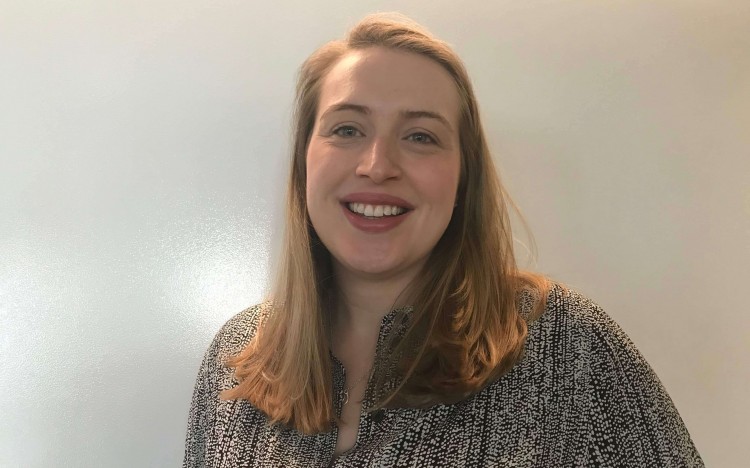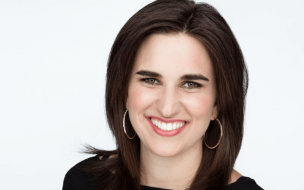Seeking a rigorous business education as well as a career shift, in 2011 Sarah swapped her career in TV—during which she worked for MTV and the Discovery Channel—for the MBA at Stanford Graduate School of Business (GSB). There were jobs she was looking to get three-to-five years down the line, she explains, that all included ‘MBA preferred’ in their job description.
Sarah (pictured below, right) now works for Spotify, as director of business marketing for Europe, Middle East, and Africa (EMEA). She found the job through an old colleague from MTV—the hiring manager also had an MBA—and they were looking for someone to front their Business Marketing team.
The Stanford MBA, she says, was the catalyst, and exposed her to an environment geared towards empowering women in business.
“It was in the back of my mind that as a woman, having a qualification like an MBA gives you a lot of flexibility,” she says.
On the Stanford MBA, Sarah adds, students are inspired by female entrepreneurs and successful businesswomen who return to share their experiences with the class; “If they’ve done it, why can’t I?”
How the Stanford MBA empowers women in business?
Sarah says there’s a culture within the Stanford MBA Program that encourages students to be vulnerable about the mistakes they’ve made, or things they’d liked to have done differently. “Failure is not a negative thing,” she says.
She was also exposed to multiple career paths and business opportunities she didn’t know about, all under the umbrella of equality she says emanates in the MBA classroom.
“I think sometimes women don’t realize all of the things they could do because they’ve never seen someone do it [before],” she explains. “In the classroom everybody brings different perspectives, and those perspectives are really valuable.”
Outside of the classroom, Sarah signed up for the Women in Management (WiM) club’s WiM Groups. Students who sign up are randomly assigned to a small group of other WiM club participants, who meet every two weeks with a trained facilitator. WiM Groups create an empowering environment and an inclusive community that supports women at the GSB and beyond.
Sarah says her WiM group bonded immediately over conversations about their past experiences and career aspirations. They continued the group after the Stanford MBA and have remained in touch for almost six years.
They still have a Google Hangout call once a month for two hours and go on an annual weekend retreat together. “When something happens, they’re the first people I think of calling,” Sarah adds. “The WiM group was probably the best thing to come out of the MBA for me.”
Touchy Feely on The Stanford MBA
One of the most famous courses at Stanford is Interpersonal Dynamics—a thorough exploration into personal discovery and development—voted the most popular course for the past 45 years and known colloquially as ‘Touchy Feely’.
Margaret Wang, Stanford MBA ’15, says that the course completely changed the way she approaches conversations and relationships, and the way in which she can give and accept feedback in workplace or personal situations.
“It gave me an incredible toolkit that I not only pull on every day, but also use just when I’m talking to folks,” she says.
Most of the learning occurs in small, intimate groups of 12 students, where they observe how individual behaviour affects others in real time, practice leadership skills, and learn to connect across each person’s idiosyncrasies.
“All of this work is rooted in knowing who you are, how others impact you and how you impact others,” she explains. “Coming out of Stanford GSB it’s inexplicable how much it’s impacted my way of being.”
An opportunity for career transformation
Margaret (pictured below, right), who worked at Merrill Lynch and Goldman Sachs before the Stanford MBA, says that although she loved that work, going to Stanford allowed her to explore the aspects of personal development that would allow her to achieve her goals.
“For me showing up as an authentic leader is huge, and I wouldn’t have been able to do that without the focus GSB has on personal development,” she says.
Now, at Bridgewater Associates, she uses her authentic leadership style to mediate efforts between different levels of seniority—she’s also leading her branch’s China effort.
After Stanford Graduate School of Business she continued to hone her management skills as part of the regional leadership team for the Stanford GSB Women’s Circles—groups of intergenerational Stanford alumnae who meet monthly to reflect and talk about their lives and interests.
To add another string to her bow, Margaret is also the youngest president in the modern history of the Harvard Alumni Association—where she completed her undergrad. Her Stanford MBA leadership training prepared her for this role, where she liaises with 350 board members, overseeing more than 323,000 alumni.
A final point Margaret makes is the importance of including men in conversations around women in leadership and gender parity.
In her second year she shared a house with Jeff Barnes, an MBA student who grew up outside of Chicago with both parents in the corporate world.
Growing up with a strong role model like his mother meant Jeff saw the need to set up WiMen, a group of men at Stanford GSB who support women in the workplace.
“You can’t just have women supporting women all the time, you need the other half of it,” says Margaret.
“Seeing that systemic need I thought was excellent. It’s part of the culture of the place, the notion of people taking the initiative when they see they need to make a change—that’s a core mantra of the GSB.”








